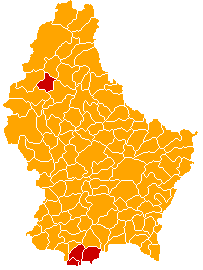2009 Luxembourg general election
| ||||||||||||||||||||||||||||||||||||||||
All 60 seats in the Chamber of Deputies 31 seats were needed for a majority | ||||||||||||||||||||||||||||||||||||||||
This lists parties that won seats. See the complete results below.
| ||||||||||||||||||||||||||||||||||||||||
 |
|---|
General elections were held in
Juncker-Asselborn Ministry II
, which was sworn in on 23 July 2009.
Parties
Seven parties ran candidates in all four
independent deputy Aly Jaerling
, ran in two constituencies.
| List # | Party | Running in | Seats | |||||
|---|---|---|---|---|---|---|---|---|
Centre
|
Est
|
Nord
|
Sud
|
2004 | Pre-election | |||
| 1 | Communist Party (KPL) | 0 | 0 | |||||
| 2 | Greens | 7 | 7 | |||||
| 3 | Alternative Democratic Reform Party (ADR) | 5 | 4[2] | |||||
| 4 | Luxembourg Socialist Workers' Party (LSAP) | 14 | 14 | |||||
| 5 | Democratic Party (DP) | 10 | 10 | |||||
| 6 | The Left | 0 | 0 | |||||
| 7 | Christian Social People's Party (CSV) | 24 | 24 | |||||
| 8 | Citizens' List | 0 | 1[2] | |||||
Results
 | |||||
|---|---|---|---|---|---|
| Party | Votes | % | Seats | +/– | |
| Christian Social People's Party | 1,129,368 | 37.34 | 26 | +2 | |
| Luxembourg Socialist Workers' Party | 695,830 | 23.00 | 13 | –1 | |
| Democratic Party | 432,820 | 14.31 | 9 | –1 | |
| The Greens | 347,388 | 11.48 | 7 | 0 | |
| Alternative Democratic Reform Party | 232,744 | 7.69 | 4 | –1 | |
| The Left | 109,184 | 3.61 | 1 | +1 | |
| Communist Party of Luxembourg | 49,108 | 1.62 | 0 | 0 | |
| Citizens' List | 28,512 | 0.94 | 0 | New | |
| Total | 3,024,954 | 100.00 | 60 | 0 | |
| Valid votes | 190,213 | 93.45 | |||
| Invalid/blank votes | 13,322 | 6.55 | |||
| Total votes | 203,535 | 100.00 | |||
| Registered voters/turnout | 223,842 | 90.93 | |||
| Source: Nohlen & Stöver[3] | |||||
By locality

As in 2004, the CSV won pluralities in each of Luxembourg's four circonscriptions, and pluralities in nearly all of Luxembourg's communes. Only four communes didn't register pluralities for the CSV (down from seven in 2004). Wiltz in the north and Dudelange, Kayl, and Rumelange in the southern Red Lands voted for the LSAP.
The CSV's performance improved most markedly in
Est
.
| CSV | LSAP | DP | Greens | ADR | Left | KPL | BL | |
|---|---|---|---|---|---|---|---|---|
| Centre | 38.6% | 17.8% | 19.4% | 13.2% | 6.3% | 3.5% | 1.1% | 0.0% |
| Est | 41.5% | 16.2% | 15.4% | 14.2% | 9.5% | 2.3% | 1.0% | 0.0% |
| Nord | 39.6% | 17.4% | 18.2% | 10.8% | 10.3% | 2.0% | 1.0% | 0.8% |
| Sud | 35.6% | 28.2% | 10.1% | 10.2% | 7.9% | 4.1% | 2.2% | 1.7% |
Aftermath
The CSV's large margin of victory guaranteed that it would form the government once again, with
Minister for Finances, to be replaced by Luc Frieden.[4] This brought into question his chairmanship of the Europe-wide Eurogroup, which he had chaired since 2005. However, he has since stated that he would remain in charge of monetary policy and relations with the European Central Bank.[5]
The CSV was in a strong enough position to form a coalition with any one of three parties: LSAP (partner in the
Deputy Prime Minister
, with the new government forming on 23 July.
References
- ^ The Left is technically not a party, but an electoral alliance.
- ^ a b Aly Jaerling was elected as a member of the Alternative Democratic Reform Party in 2004, but now sits as an independent and is running for Citizens' List.
- ISBN 978-3-8329-5609-7
- ^ "Juncker précise qu'il ne souhaite pas quitter la présidence de l'Eurogroupe" (in French). Le Monde. 4 June 2009. Retrieved June 10, 2009.
- ^ "ECOFIN: EU's Juncker Wants To Remain Head of Eurogroup". The Wall Street Journal. 8 June 2009. Retrieved June 10, 2009. [dead link]
- ^ Glesener, Marc (9 June 2009). "DP und Déi Gréng sagen Nein" (in German). Luxemburger Wort. Archived from the original on 12 June 2009. Retrieved June 13, 2009.
